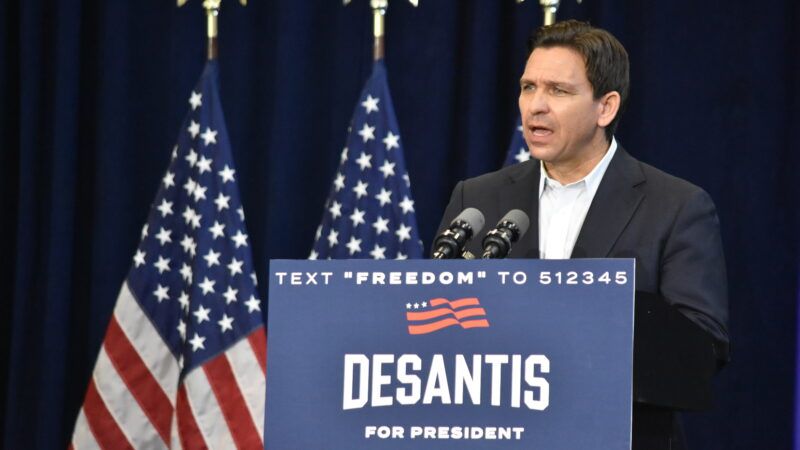Ron DeSantis' Unconvincing Economic Reset
Though an improvement over his obsession with wokeness and culture wars, DeSantis can't seem to ditch the populist demagoguery.

In an attempt to kick-start his sputtering presidential bid, Florida Gov. Ron DeSantis, a Republican, has shifted his focus toward economic issues and away from the culture war obsession that defined the early stages of his campaign.
The pivot is a welcome—and probably necessary—change that gives DeSantis an opportunity to talk about actual conservative policies rather than seeking new ways to threaten to use state power against private entities the governor dislikes. In recent campaign speeches, an op-ed published Monday in USA Today, and the "Declaration of Economic Independence" published on his campaign website, DeSantis has pivoted toward talking about the worrying size of the national debt, the growth of regulatory burdens, and how both are crushing growth.
But even as he switches gears, DeSantis still seems stuck in that frame of mind that defined his culture war antics—a mentality that could stall the candidate's attempted reboot.
The best example comes in bold text right at the bottom of DeSantis' new economic declaration. "The goal of our declaration of economic independence is simple: We win. They lose."
Much of the document is focused on spelling out who and what "they" might be. At one point, near the top, DeSantis even claims that "it's time to name names and defeat those people and institutions that have formed the root cause of this economic malaise."
Unfortunately, there aren't many specifics actually offered. Instead, he settles for criticizing broad classes of people. The "central planners who seek to advance their political agendas," the "class of progressive corporations looking out for every interest except for that of the American people," and especially the "failed elites that have orchestrated American decline." (In the brief declaration, DeSantis mentions those unnamed "elites" no fewer than five times, and always pejoratively.)
That is, at best, a pretty phony line of attack coming from a guy with an undergraduate degree from Yale and a law degree from Harvard.
But it's more than that. It's straight-up populist demagoguery and class warfare—tactics that seem incongruous with DeSantis' supposed pivot toward economic issues. As Dominic Pino notes at National Review, it's the sort of argument that conservatives rightly dismiss when they hear it coming from the populist left. "We're used to hearing Bernie Sanders talk about how 'the billionaires' are responsible for our problems, or Elizabeth Warren decry 'corporate greed' as the cause of every ill," Pino writes. "Politicians on the left believe more government is good, so it makes more sense for them to blame some nondescript group of wealthy or powerful people that most Americans can't relate to. But DeSantis says he wants to scale back the federal government, and his actual policy ideas contain some helpful moves in that direction. So why the class warfare?"
It's a good question, and one that you won't find satisfactorily answered within the declaration or the op-ed. DeSantis has carried over the us-vs.-them framing that defined many of his anti-woke political stunts, but applying that logic to economic issues makes even less sense.
Take, for example, DeSantis' stated goal of achieving 3 percent economic growth through a combination of simplifying the tax code and cutting burdensome federal regulations. There's no need to wrap that promise within a "we win, they lose" zero-sum view of the world. Isn't higher economic growth good for everyone?
Or look at what DeSantis says about the danger of reckless federal borrowing, which he (correctly) points out has added to inflation. "American families have seen their quality of life and economic security diminish while our national debt has exploded," he writes in his declaration.
But merely blaming "elites" for that mess would be a cop-out even if DeSantis didn't literally promise to "name names" just three sentences later. The two men who are largely responsible for the reckless spending and borrowing that's taken place over the past seven years are President Joe Biden and former President Donald Trump. Trump oversaw a dramatic increase in government spending—the federal budget climbed from $3.98 trillion in fiscal year 2017 to $4.45 trillion in 2019—even before the COVID-19 pandemic arrived and blew the deficit to previously unimaginable highs. On the back end of the pandemic, Biden signed the $2 trillion American Rescue Plan, despite warnings from economists the stimulus package would overheat the economy and trigger an inflationary spiral, which it did.
Trump and Biden also happen to be the two men who DeSantis probably has to defeat if he's going to win the White House. What does DeSantis have to lose by calling them out directly for their fiscal malfeasance?
That, in a nutshell, is what makes DeSantis' economic pivot so unsatisfying. Even when the facts are on his side, the governor can't seem to let go of the language of class warfare and populism.
It's easy to see the shape of a better DeSantis campaign within the contours of his new economic policy agenda. After Americans have been battered by a pandemic and high inflation, a candidate like DeSantis could use the past seven years to make a compelling case against the way both Trump and Biden handled economic policy. The national debt was less than $20 trillion when Trump took office in 2017 and stands at $32.6 trillion today. The federal government has borrowed more than $12 trillion (and counting) over the course of two presidential terms, and put it all on a tab for your children, he could say. And for what? Are you better off than you were in 2016?
Embracing that sort of Reaganite economic message will be impossible as long as DeSantis remains hobbled by zero-sum, populist politicking.


Show Comments (312)